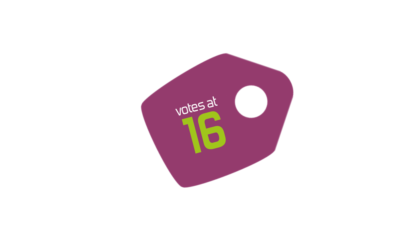- Study
- International
- Business and employers
- Research
- About us
In this post, Ben discusses his recent article: 'Missing an opportunity? The limited civic imagination of Votes at 16'.

The British Youth Council. All Party Parliamentary Group on Votes at 16
I wrote an article about Votes at 16. Before I talk about my article, my research, and votes for 16-year-olds, I want to talk about a bigger issue, and that’s politics at 16.
Let’s start with something straightforward: teenagers have opinions, and teenagers can take political action. The fact that teenagers do politics is not new. It is not always a comfortable fact for adults to deal with.
Take school strikes, for instance. As Dr Aoife Daly puts it, young people who go on strike from school are the target of a great deal of adult prejudice as the recent school strike movement for action on climate change, Fridays for Future, demonstrates. My research with climate strikers shows some of the ways that young people claim the right to action, including protest, despite a mix of support and opposition from the older people around them. Today’s school strikers are part of a long history of school strikes in the UK dating back at least to 1899. Young people including children and teenagers have a part in our democratic society. In the UK teenagers have done lots of things. They have gone on strike from school, campaigned with petitions and fundraising, written to MPs, and all sorts. They also vote at 16 already, in some elections in Scotland and Wales.
Votes at 16: Missing an opportunity
In my article on Votes at 16, which I called ‘Missing an opportunity? The limited civic imagination of Votes at 16’, I asked about Votes at 16 for Parliament elections at Westminster. I didn’t try to argue for or against Votes at 16. Rather, I asked, what does Votes at 16 look like. And I argued that Votes at 16 for Westminster elections look like a missed opportunity in the making.
I argue that Votes at 16 are missing an opportunity for three reasons, but the main one is that it is framed around deficit. By that I mean Votes at 16 is coming about in the UK as a policy about fixing young people as deficient members of society. It is being talked about, debated and even written up into policy not, in the first place, as a way of having political power, but as a process of engaging, educating and ‘bringing in’ young people to the political system.
One problem with this approach is that young people who are ‘brought in’ to the political system tend to leave it disappointed, disaffected and, often, perplexed by the failure of democratic systems to live up to their promises.
The assumption that young people are outside politics and must be brought in neglects the political in children and teenagers’ lives already, but it also lets the political system off the hook.
Regenerating the vote
Votes at 16 should be seen as an opportunity to ask questions about the political system, about elections and about political representation in the UK. As I write in my article, voting is not just about having a voice. The vote is about having power. It’s not just young people who feel their votes don’t give them enough power, or feel disappointed by politicians. Votes at 16 is an opportunity for us all to discuss these things and consider positive, productive transformations.
For instance, while Votes at 16 are usually talked about alongside new forms of citizenship education that can engage and educate young people, the current debate would be a fantastic opportunity to reform our political imagination about citizenship. Being a citizen doesn’t happen once every five years at a Parliamentary election. Nor does it begin at 18, or even 16. Children are developing, learning and constructing their identities, belongings and communities at a very young age, and we can learn from children about the richness of ‘politics’ that goes on in all our lives, quite apart from electoral participation.
Votes at 16 can be part of a wider, systemic reform to UK politics but we have to start with a wider, more adventurous conversation. Our question really needs to be, what’s the point in voting at any age? Asking these difficult questions, and thinking creatively about what changes we want to politics, would be a far more productive way to debate Votes at 16. We are missing the opportunity to have that conversation and if we’re not careful, the chance will be gone.
Monday, 19th July 2021
